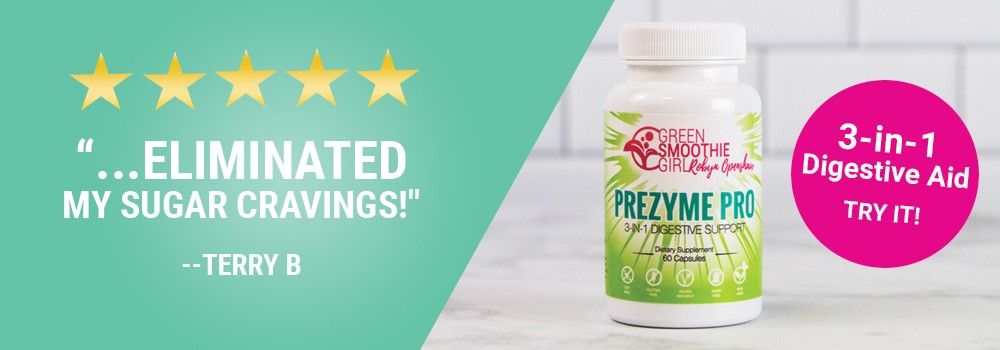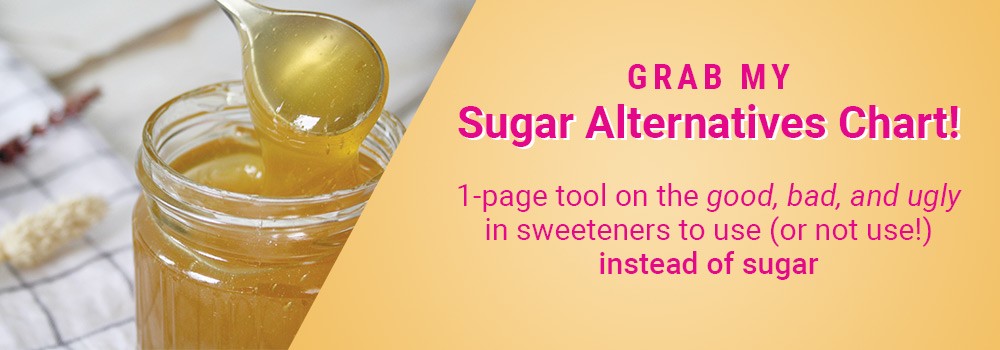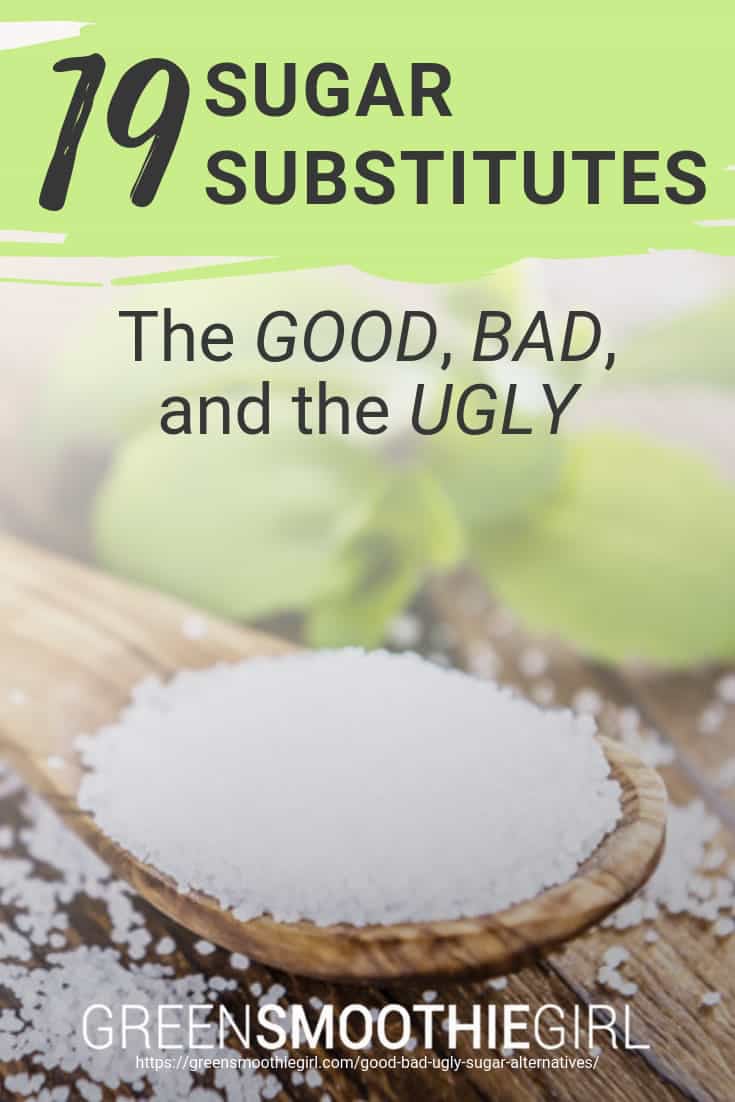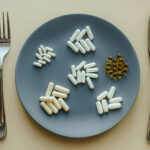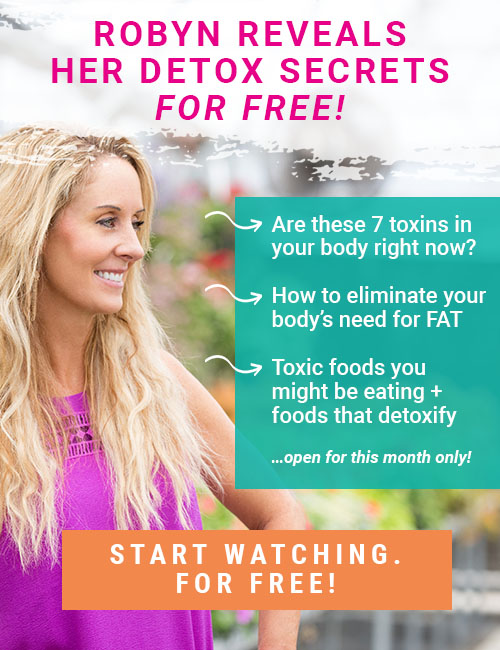19 Sugar Substitutes: The Good, Bad, And The Ugly to Help You Choose the Right Sugar Alternative for You
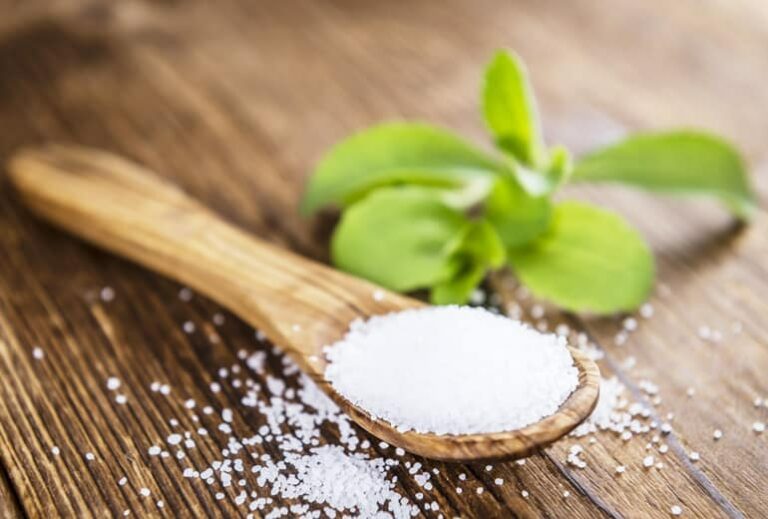
Dear GreenSmoothieGirl: What sugar replacement is the best?
I can’t even count how many times I’ve been asked this question! Because if you — like me— have battled a sugar addiction, your next logical question is, “Okay, if I’m going to ditch sugar, what CAN I use?”
In this post:
- Sifting the Sugar Substitutes
- The Good: Healthy Sweeteners and Sugar Alternatives
- The Bad: Sugar Substitutes to Avoid
- The Ugly: Sugar Substitutes That Are WORSE Than Refined Sugar
- Your Cheat Sheet for Sugar Substitutes
- An Important Reminder About Sugar Substitutes
- Conclusions About Sugar Substitutes
The good news is, there’s plenty of sugar replacements that won’t gum up your liver, put you on a fast track to diabetes, suppress your immune system, or cause colon cancer (and that’s just a sample of the ways sugar can ruin your health!)
In this article, we’ll talk about which sugar substitutes are best, which ones you should avoid like the plague, and which sugar substitutes are ideal for different types of recipes.
Sifting the Sugar Substitutes
We all know that refined sugar and high-fructose corn syrup are the nasties: The super-processed, super addictive, super unhealthy substance that find their way into everything from tomato sauce to candy.
And the more people learn how deadly sugar and high-fructose corn syrup are, the more sugar alternatives enter the market.
With so many options to choose from, it’s no wonder people are confused! But the truth is, “sugar substitute” doesn’t equal “healthy.” Some sugar substitutes can be a positive addition to your diet and your health— while others can actually make things worse.
So, without further ado, here’s the good, the bad, and the ugly!
The Good: Healthy Sweeteners and Sugar Alternatives
When swapping out sugar for a whole-food substitute, consider these 11 sweeteners first. They’re whole foods, plant based, and extremely versatile in different kinds of recipes:

Whole-food, plant-based sweeteners are better choices for sweeteners.
- Honey: Raw honey is extremely nutritious and high in minerals. Look for raw (not heat treated) local honey for its high enzyme content, as well as its anti-allergy and immune-strengthening properties. As an added bonus, raw honey is very sweet, so you can substitute about half the amount you would normally use when sugar is called for in a recipe (and cut ⅛ of the liquid). Keep in mind that honey’s effect on your blood sugar is pretty similar to sugar, and it’s high in calories, so use it sparingly.
- Real Maple Syrup: Don’t mistake this mineral-rich whole food for the maple-flavored corn syrup that passes as “syrup” on the shelves! Real maple syrup is a great topping for foods like oatmeal, or a sweetener for beverages and dressings. Like honey, it is high in calories, so use a light touch.
- Blackstrap Molasses: Not everyone likes its strong taste, but if you’re partial to the unique tang of molasses, it makes great ginger cookies and granola. Buy blackstrap molasses in its organic and unsulphured form, and you’ll have a very nutritious sweetener that’s high in iron and B vitamins.
- Yacon Syrup: With a glycemic index of 1, yacon syrup has burst onto the scene as a healthy sweetener that also happens to contain one of the best known sources of prebiotic fiber. It can be more difficult to find than the other liquid sweeteners (and has a fairly strong taste) but it’s nice as a light topping or a beverage sweetener.
- Stevia: Available as a powder or liquid, stevia is non-caloric, 200 times sweeter than sugar, and has virtually no impact on blood sugar. It’s so concentrated that you’ll just want to use a pinch or a few drops to sweeten foods or beverages. Stevia has none of the body or volume of regular sugar, so consider this when using stevia for baking, by substituting every cup of sugar you replace with a bulking substance like apple sauce, yogurt, or pureed fruit, or egg whites.
- Sucanat: This brand of dehydrated cane juice is essentially the unprocessed version of white sugar — without the nutrition removed and the product bleached. Sucanat is perfect for baking, as the taste is familiar and neutral and can be used in a 1:1 ratio when sugar is called for. However, don’t consider this product’s superiority to refined sugar to be a free license to indulge in an unlimited way. It’s still a high calorie, concentrated sweetener (glycemic index: 65) and should be used sparingly.
- Raw Organic Coconut Palm Sugar: This is my favorite sweetener for baking, with its neutral taste, low glycemic index of 35, and easy 1:1 substitution for refined sugar in recipes. Raw organic coconut palm sugar is also rich in minerals and can be grown sustainably, making it nutritionally and ethically superior to Sucanat.
- Raw Organic Dates: Dates are an ancient food that is extremely nutritious and very sweet. I’ll often put a couple of dates in my morning smoothie! You can get or make dates in pureed form to substitute 1:1 for refined white sugar in a recipe.
- Mesquite: Made from the pods of the mesquite tree, this sugar substitute has a sweet, nutty flavor. It’s high in minerals, soluble fiber, and even has protein! Use mesquite to add sweetness to smoothies and other beverages. It can also be used to substitute about 25% of the flour in a baking recipe (and you can then reduce some of the added sugar, to taste).
- Lucuma: This superfruit is a native of Peru. Like stevia, it has no calories, but is rich in beta-carotene, iron, zinc, vitamin B3, calcium, magnesium, dietary fiber, protein, and even antioxidants. And with a glycemic Index of just 4, lucuma is a great choice for diabetics or really anyone else who wants to keep their blood sugar under control. Use lucuma powder 2:1 for sugar in a recipe.
- Luo Han Guo (Monk fruit): Monk fruit is a small melon native to eastern Asia that’s extremely high in antioxidants — and about 200 times sweeter than sugar. Buy it in powdered form with no fillers added, for an excellent sugar substitute. Like stevia, luo han guo has no calories and is extremely sweet. and is best used by starting with a tiny amount, and adding bit by bit to taste.
The Bad: Sugar Substitutes to Avoid
Unfortunately, some sugar alternatives are just as bad as refined sugar is,1 and identifying these marketing claims and nutritional info to land on the truth can be daunting. Lucky for you, we’ve done all the legwork!

Eating a lot of added fructose can wreak havoc on your metabolic health.
While all of these sweeteners are plant-based sweeteners (and therefore beat out artificial sweeteners), I recommend that you stay away from them:
- Fructose: This is the sugar found naturally in fruit, and is fine in small amounts. But it can only be metabolized by the liver. In other words, excess amounts (as added sugars) are acid-forming, disease-promoting, and have to be converted to fat since most bodily cells can’t use them.
- Agave: While agave has a low glycemic index, it’s also extremely high in fructose and easy to overuse. Many of the health claims made about agave are true about the plant— and completely false about the processed agave syrup that has been refined and stripped of enzymes through heat processing (a method extremely similar to how corn syrup is made). For about 10 years, agave was the darling of the sugar alternatives and has since fallen from favor.
- Erythritol, Xylitol, Maltitol, Sorbitol: These and other sugar alcohols have a low glycemic index. They are usually made from cornstarch (often GMO) and are altered chemically so they aren’t well-absorbed in the gut–leading to gastric distress for many people (bloating, gas) or even leaky gut syndrome.2
The Ugly: Sugar Substitutes That Are WORSE Than Refined Sugar
NEVER, ever use these sugar substitutes! These toxic chemicals are far worse than refined sugar (which is saying a lot). I’d rather feed my family refined sugar than any of these toxic chemicals:
- Saccharine (Sweet n Low): This chemical sweetener was one of the first artificial sweeteners, and was originally made from coal tar. Despite being connected to cancer in mice (and likely humans)3, it’s still available, though not as prevalent as it once was. Still, I’d choose saccharine (or ANYTHING, really) over the ugliest of the ugly, #2.
- Aspartame (e.g., NutraSweet, Equal): Saccharine’s tarnished reputation gave rise to aspartame, one of the most neurotoxic food additives ever created. This poison has the dubious honor of being the FDA’s most-reported food additive for causing seizures,4 migraines, depression, weight gain, insomnia, joint problems, fatigue, and triggering or worsening chronic conditions. Of about 5,000 approved food-additive chemicals, aspartame has more complaints against it than any other food additive.5 Synthetic sugar substitutes are a powerful billion-dollar industry, and that’s the ONLY reason aspartame is still in the food supply today.
- Sucralose (Splenda): Besides being linked to gut problems, weight gain, metabolic issues, and elevated insulin,6 sucralose breaks down when heated and can interact with other cooking or baking ingredients, forming cancer-causing dioxins!6
- Truvia: This sweetener is newer on the market, and touted as “stevia based,” but is still chemically altered. It’s actually mostly erythritol (a sugar alcohol) with a highly concentrated stevia isolate called Rebaudioside A, plus mystery “natural flavors” to mask the bitterness. I predict it will be as problematic as the other fake sweeteners have been. Every time industry creates a fake molecule, the body reacts badly.
- Corn Syrup: Nearly all corn is genetically modified, but that’s not even the most important reason to avoid corn syrup. Corn syrup is highly-refined, concentrated fructose that inflames and ages your cells, erodes your gut lining, and forms high amounts of acid. Corn syrup also easily overwhelms the liver’s ability to get rid of it, so it gets stored as fat. That’s why high-fructose corn syrup is linked to obesity, metabolic syndrome, insulin resistance, candida, diabetes,7 heart disease,8 and food addictions. Any discussion of corn syrup sends my lifelong anxiety (which is usually completely under control on a diet of whole foods) into instantaneous orbit. Please don’t ever eat it.
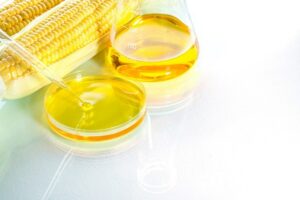
Corn syrup is nearly always derived from GMO corn.
Your Cheat Sheet for Sugar Substitutes
I know this is a LOT of information to remember! That’s why I’ve condensed it all into my printable Sugar Alternatives chart, and even included conversions for swapping out sugar for one of the better sweeteners.
Between the brand names and the marketing spin, it can be hard to remember which sweeteners are good, bad, and ugly. Just print out this handy guide and tape it inside your cupboard for reference, so you can enjoy a sweet treat once in a while without the downside to those ugly processed and chemical sweeteners. Grab your cheat sheet here!
An Important Reminder About Sugar Substitutes
Remember: The end goal here isn’t to continue eating endless amounts of sweet treats, even if you use only sweeteners on the “good” list. “Good” is still relative. The BEST sweet foods are fruits! They come in a whole-foods package with fiber, lots of micronutrients–nature made them perfect, and nobody ever got diabetes from eating fruit in its whole form! EVER.
[Related: How To Avoid Hidden Added Sugar In Your Food]
The point of moving toward a high-vibration, whole-foods lifestyle is to retrain your palate to enjoy the natural sweetness of whole foods, where “treats” are once in a while, and not an all-day habit.
Conclusions About Sugar Substitutes
The writing's on the wall: Sugar is bad news. But that doesn’t mean a free pass on sugar substitutes!
Some plant-based whole food sugar substitutes, like Stevia, honey, and monk fruit, can improve your health — while others, like aspartame, can wreak havoc on your body far more than sugar ever could.
One of the best things you can do for your overall health is to kick sugar to the curb — and replace it in moderation with a healthy substitute!
Make sure to get your free, printable Sugar Alternatives chart.
[Read Next: Need A Healthy Treat? 6 Swaps For Your Favorite Recipes]

Disclosure: This post may contain affiliate links that help support the GSG mission without costing you extra. I recommend only companies and products that I use myself.
Resources:
- Tandel KR. Sugar substitutes: Health controversy over perceived benefits. J Pharmacol Pharmacother. 2011;2(4):236-43.
- Halmos EP, Power VA, Shepherd SJ, Gibson PR, Muir JG. “A diet low in FODMAPs reduces symptoms of irritable bowel syndrome.” Gastroenterology. 2014 Jan; 146(1):67-75.e5. Epub 2013 Sep 25.
- Reuber MD. Carcinogenicity of saccharin. Environ Health Perspect. 1978;25:173-200.
- Maher TJ, Wurtman RJ. Possible neurologic effects of aspartame, a widely used food additive. Environ Health Perspect. 1987;75:53-7.
- Briffa, John. "Aspartame and its effects on health: Independently funded studies have found potential for adverse effects." Bmj 330.7486 (2005): 309.
- Schiffman SS, Rother KI. Sucralose, a synthetic organochlorine sweetener: overview of biological issues. J Toxicol Environ Health B Crit Rev. 2013;16(7):399-451.
- Bray GA. Energy and fructose from beverages sweetened with sugar or high-fructose corn syrup pose a health risk for some people. Adv Nutr. 2013;4(2):220-5. Published 2013 Mar 6. doi:10.3945/an.112.002816
- Yoo S, Ahn H, Park YK. High Dietary Fructose Intake on Cardiovascular Disease Related Parameters in Growing Rats. Nutrients. 2016;9(1):11. Published 2016 Dec 26. doi:10.3390/nu9010011
Posted in: Whole Food


